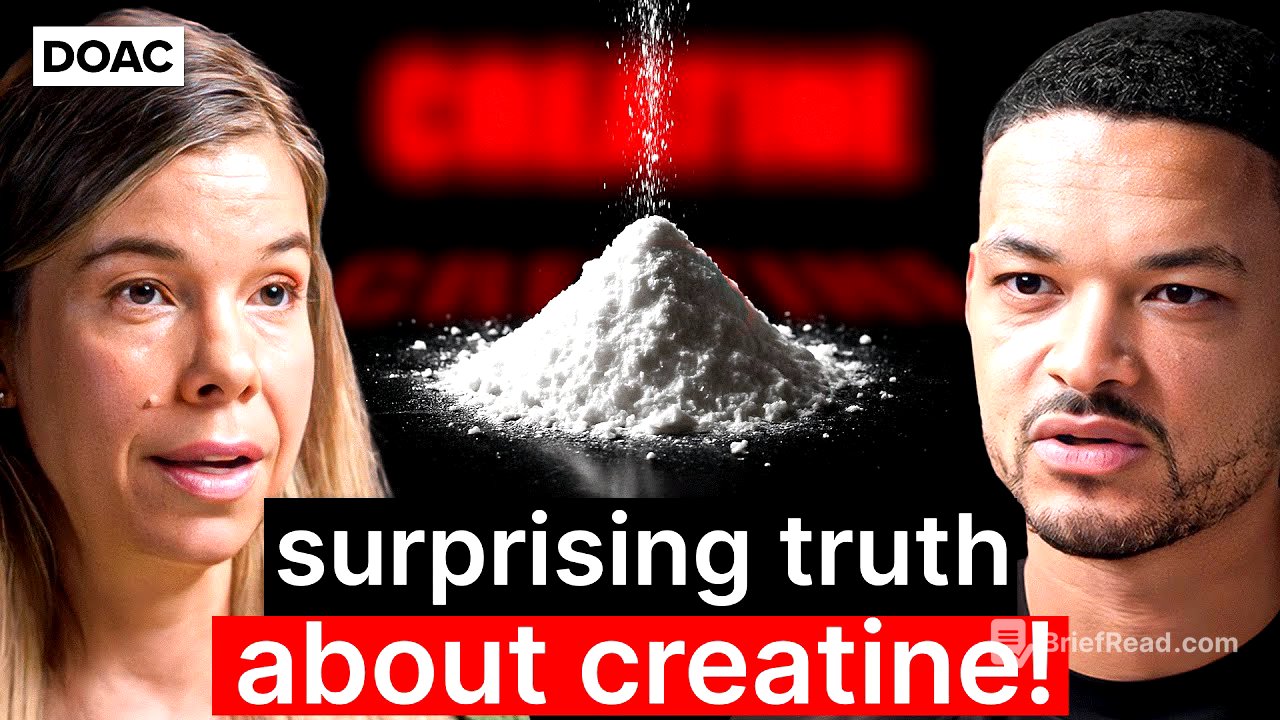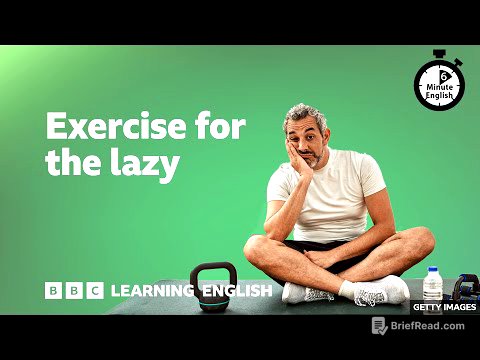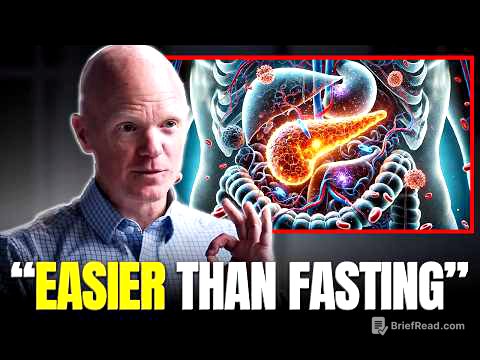TLDR;
This video features an interview with Dr. Rhonda Patrick, a biomedical scientist, who discusses various lifestyle and nutritional strategies to improve healthspan and lifespan. She emphasizes the importance of exercise, particularly high-intensity interval training, and the role of nutrition, including vitamin D, omega-3 fatty acids, and creatine, in maintaining cognitive and physical health. The conversation also covers the potential benefits of ketogenic diets, fasting, and emerging therapies like gene reprogramming for aging.
- Lifestyle choices significantly impact aging, with genetics playing a smaller role.
- High-intensity interval training can reverse age-related heart damage and improve cognitive function.
- Nutritional interventions, such as vitamin D and omega-3 supplementation, can reduce the risk of dementia and improve overall health.
Intro [0:00]
The video opens with a montage of alarming statistics about widespread deficiencies in essential nutrients like vitamin D and omega-3, and the risks associated with sedentary lifestyles. Dr. Rhonda Patrick is introduced as a scientist deeply passionate about optimizing health and longevity through simple, actionable changes. The host emphasizes the importance of viewers subscribing to the channel to support its mission of providing valuable health information.
My Mission to Improve People's Health [2:04]
Dr. Patrick explains her mission to share information that can help people make simple but significant changes to improve their healthspan. She notes that many people are unaware of the tools available to them that can greatly improve how they age. Her goal is to bridge this knowledge gap, enabling individuals to live healthier and feel better through evidence-based practices.
What Impact Will Rhonda's Research Have on People? [3:37]
Dr. Patrick discusses the potential impact of her research, highlighting that simple interventions like vitamin D supplementation can significantly reduce the risk of diseases like dementia and improve overall quality of life. She stresses that while some changes require effort, such as exercise, the benefits are immense, affecting mood, energy levels, and long-term disease risk.
The Role of Genetics in Aging vs. Lifestyle [5:09]
Dr. Patrick addresses the common misconception that aging is primarily determined by genetics. She clarifies that lifestyle factors account for approximately 70% of aging, using the example of two 70-year-olds with vastly different health outcomes. She emphasizes that exercise, nutrition, and other lifestyle choices can significantly delay aging and improve quality of life.
The Future of Aging, Longevity, and Gene Therapy [9:53]
Dr. Patrick expresses excitement about emerging gene therapies that could potentially reprogram cells to a younger state. She references Shinya Yamanaka's Nobel Prize-winning work on induced pluripotent stem cells, explaining how old cells can be reprogrammed to become embryonic stem cells through the addition of four proteins called transcription factors. She discusses partial reprogramming, a technique that rejuvenates cells without erasing their identity, and its potential to reverse aging in various organs.
Death-Related Risks of Being Sedentary [15:15]
Dr. Patrick asserts that sedentary behavior is a disease, posing a greater risk of premature death than conditions like type 2 diabetes, cardiovascular disease, and even smoking. She cites the Dallas Bed Rest Study, which demonstrated that three weeks of inactivity can have a more detrimental impact on cardiovascular health than 30 years of aging. She emphasizes that improving cardiorespiratory fitness is crucial for longevity.
How to Improve Your Cardiorespiratory Fitness [22:17]
Dr. Patrick recommends high-intensity interval training (HIIT) as the most effective way to improve cardiorespiratory fitness. She explains that HIIT involves short bursts of intense exercise followed by periods of rest, pushing the heart rate to around 80% of its maximum. She contrasts this with moderate-intensity exercise, which may not be as effective for improving cardiorespiratory health.
Best Workout Routine to Improve Cardio Health [25:32]
Dr. Patrick suggests the Norwegian 4x4 protocol as a highly effective HIIT method. This involves four 4-minute intervals of intense exercise, such as cycling or rowing, followed by 4 minutes of recovery. She also mentions other options, such as 1-minute on, 1-minute off intervals, and Tabata training, emphasizing that even short bursts of high-intensity exercise can significantly improve cardiorespiratory fitness.
Norwegian 4x4 Training Explained [30:01]
Dr. Patrick elaborates on the benefits of the Norwegian 4x4 training, highlighting a study that showed it can reverse age-related structural changes in the heart by 20 years. She explains that high-intensity exercise can make the heart larger and less stiff, resembling that of a younger person. She provides practical guidance on how to perform the Norwegian 4x4, including warm-up, intensity levels, and recovery periods.
How the Body Generates Energy and Exercise Intensity [32:28]
Dr. Patrick explains how the body generates energy during high-intensity exercise, noting that when muscles cannot get oxygen quickly enough, they use glucose to produce energy, resulting in the production of lactate. She highlights that lactate is not just a byproduct but a signaling molecule that communicates with other organs, such as the brain, and promotes the release of brain-derived neurotrophic factor (BDNF), which supports neuron growth and cognitive function.
Why We Can’t Drink Lactate and the Impact of Vigorous Training [38:14]
Dr. Patrick addresses the question of why lactate cannot be directly consumed for its benefits. She explains that while lactate can be administered intravenously to improve recovery from traumatic brain injuries, oral consumption results in lactate being utilized by the gut. She emphasizes that exercise provides a multitude of benefits beyond lactate production, including improved cardiorespiratory fitness and stress response genes.
Decline in Production of Lactate, Creatine, and Other Key Substances [41:09]
Dr. Patrick notes that as we age, the body becomes less efficient at producing beneficial substances like lactate and creatine. She suggests that this decline can be mitigated through lifestyle interventions, such as exercise and supplementation.
How to Reduce Cognitive Decline [42:20]
Dr. Patrick discusses strategies to reduce cognitive decline, emphasizing the importance of exercise. She cites a study showing that a year-long aerobic exercise program can increase the size of the hippocampus, a brain region associated with learning and memory, in older adults. She also mentions that women with higher cardiorespiratory fitness have a significantly lower risk of developing dementia.
What Causes Dementia and Alzheimer’s [46:58]
Dr. Patrick explains the causes of dementia and Alzheimer's disease, including the accumulation of amyloid-beta plaques in the brain, disrupted glucose metabolism, and genetic factors like the APOE4 gene. She highlights the importance of sleep for clearing amyloid plaques and notes that lifestyle factors can influence the risk of developing Alzheimer's, even in individuals with genetic predispositions.
Do Multivitamins Improve Cognitive Performance? [52:56]
Dr. Patrick discusses the potential benefits of multivitamins for improving cognitive performance. She references three large clinical trials that showed multivitamins can improve cognitive function, processing speed, and episodic memory in older adults. She attributes these benefits to the vitamins and minerals that are often lacking in the diet but are essential for metabolism, neurotransmitter release, and reducing oxidative stress.
70% of the U.S. Population Is Vitamin D Deficient [1:00:13]
Dr. Patrick highlights the widespread vitamin D deficiency in the U.S. population, attributing it to indoor lifestyles and factors that block UVB radiation, such as sunscreen and melanin. She explains that vitamin D is converted into a steroid hormone that affects over 5% of the human genome, regulating various functions.
Vitamin D Deficiency and Increased Risk of Dementia [1:02:59]
Dr. Patrick emphasizes the link between vitamin D deficiency and an increased risk of dementia, citing studies that have confirmed this association. She notes that vitamin D supplementation can reduce the risk of dementia and improve cognitive function in individuals with Alzheimer's disease. She recommends getting blood tests to determine vitamin D levels and suggests that most deficient individuals can achieve normal levels with a daily supplement of around 4,000 IU.
Views on the Ketogenic Diet [1:06:49]
Dr. Patrick shares her views on the ketogenic diet, noting that she is particularly interested in the benefits of beta-hydroxybutyrate, a primary circulating ketone body, for the brain. She explains that ketones can be used as an energy source by neurons and can activate brain-derived neurotrophic factor (BDNF), similar to lactate.
What Is Ketosis? [1:09:39]
Dr. Patrick explains ketosis as a metabolic state where the body primarily uses fatty acids for energy instead of glucose. She notes that during ketosis, the body produces ketone bodies as a byproduct, and beta-hydroxybutyrate is the main circulating ketone. She mentions that ketosis can be achieved through a ketogenic diet, fasting, or intense exercise.
How the Keto Diet Affects Life Expectancy [1:14:28]
Dr. Patrick discusses research on the effects of ketogenic diets on lifespan, citing studies by Dr. Eric Verdin that showed ketogenic diets can extend lifespan and improve healthspan in rodents, particularly in the brain. She explains that ketogenic diets can reduce glucose-related damage and promote the production of glutathione, a major antioxidant in the brain.
Exogenous Ketones and Cognitive Repair [1:19:30]
Dr. Patrick discusses the potential of exogenous ketones, or supplemental ketones, to repair cognitive function. She explains that exogenous ketones can provide a boost of beta-hydroxybutyrate, bypassing the body's own production mechanisms. She notes that exogenous ketones may be particularly beneficial for individuals with mild cognitive impairment or Alzheimer's disease, as they can activate BDNF and promote neuron growth.
Recommended Superfoods [1:23:53]
Dr. Patrick shares her recommended superfoods, including dark green leafy vegetables like kale and broccoli, which are rich in magnesium and sulforaphane. She also recommends blueberries, which are a source of polyphenols, and salmon, which is rich in omega-3 fatty acids.
Omega-3: Effects on Mental Health, Depression, and Longevity [1:26:33]
Dr. Patrick emphasizes the importance of omega-3 fatty acids, particularly EPA and DHA, for mental health, depression, and longevity. She explains that omega-3 fatty acids have anti-inflammatory properties and can mitigate the effects of inflammation on depression. She also cites a study that identified insufficient seafood intake as one of the top six preventable causes of death.
Is Omega-3 Supplementation the Same as a High Omega-3 Diet? [1:32:08]
Dr. Patrick discusses the omega-3 index, a measure of omega-3 fatty acid levels in red blood cells, as a long-term indicator of omega-3 intake. She cites research showing that individuals with a high omega-3 index have a longer life expectancy. She also mentions a study that found the mortality risk associated with low omega-3 levels is as high as that of smoking.
Creatine: Importance and Benefits [1:36:09]
Dr. Patrick discusses the importance and benefits of creatine, noting that the body produces creatine in the liver and brain. She explains that creatine is stored in muscles as phosphocreatine and is used to generate energy. She highlights that creatine supplementation can increase muscle mass, enhance muscle strength, and improve training volume.
Effects of Creatine on Cognitive Function [1:42:13]
Dr. Patrick discusses the effects of creatine on cognitive function, noting that creatine supplementation can improve cognitive performance, particularly under stressful conditions like sleep deprivation. She mentions a study that found creatine supplementation can eliminate cognitive deficits caused by sleep deprivation and improve performance beyond baseline levels.
How Long Does Creatine Take to Work? [1:45:21]
Dr. Patrick explains that it takes approximately one month for creatine stores in muscles to reach saturation. She discusses the loading phase, where higher doses of creatine are taken initially to saturate the muscles quickly, followed by a maintenance phase with lower doses. She notes that creatine is particularly beneficial under stressful conditions, such as cognitive stress or depression.
Does Creatine Cause Hair Loss? [1:50:54]
Dr. Patrick addresses the common concern that creatine causes hair loss, noting that there is limited evidence to support this claim. She mentions a study that found creatine supplementation did not significantly affect hair loss in men.
Rhonda’s Views on Fasting [1:53:40]
Dr. Patrick shares her views on fasting, explaining that fasting can induce ketosis and activate cellular repair processes like autophagy. She notes that intermittent fasting, or time-restricted eating, can be a sustainable way to achieve some of the benefits of fasting.
What Is Autophagy? [1:55:26]
Dr. Patrick explains autophagy as a cellular process that removes damaged or dysfunctional components, promoting cellular health and longevity. She notes that autophagy can be activated through fasting, exercise, and other stressors.
Fasting Windows to Achieve Autophagy [1:59:51]
Dr. Patrick discusses the fasting windows required to achieve autophagy, noting that longer fasting periods may be necessary to activate this process. She mentions that some individuals may benefit from occasional extended fasts, while others may find intermittent fasting more sustainable.
Intermittent Fasting: Do’s and Don’ts [2:01:46]
Dr. Patrick provides guidance on intermittent fasting, emphasizing the importance of consuming adequate protein to maintain muscle mass. She also notes that eating earlier in the day may be beneficial for blood sugar control and sleep quality.
Effects of Fasting on Sleep [2:03:03]
Dr. Patrick discusses the effects of fasting on sleep, noting that eating earlier in the day may improve sleep quality. She mentions that Dr. Satchin Panda was one of the first to observe the association between eating earlier and better sleep.
How Soon After Training Should You Take Protein? [2:05:33]
Dr. Patrick touches on the timing of protein intake after training, suggesting that it may not be as critical as previously thought. She notes that the overall protein intake over a 24-hour period may be more important than the timing of protein consumption.
Benefits of Red Light Therapy [2:11:13]
Dr. Patrick briefly mentions the benefits of red light therapy, without going into extensive detail.
Infrared vs. Traditional Saunas [2:12:20]
Dr. Patrick discusses the benefits of sauna use, noting that both infrared and traditional saunas can provide health benefits. She mentions that sauna use can mimic some of the effects of moderate-intensity aerobic exercise and can improve cardiovascular health.
Sauna Benefits: Reducing Stress and Improving Mood [2:19:26]
Dr. Patrick highlights the stress-reducing and mood-improving benefits of sauna use. She mentions that sauna use can increase growth hormone levels and reduce levels of inflammatory molecules.
What Are Microplastics and Are They Harmful? [2:22:56]
Dr. Patrick discusses the issue of microplastics, noting that they are present in many everyday items and can be released into food and water. She explains that microplastics can be absorbed into the bloodstream and may have harmful effects.
The Role of Fiber in Eliminating Microplastics [2:28:33]
Dr. Patrick highlights the role of fiber in eliminating microplastics from the body. She explains that fiber can bind to microplastics in the gut, preventing their absorption and promoting their excretion.
What Is BPA? [2:31:13]
Dr. Patrick discusses BPA, a harmful chemical found in plastics that can interfere with the endocrine system. She notes that many products are now labeled as BPA-free but may contain other harmful chemicals like BPS.
Are There Risks to Living Near a Golf Course? [2:32:28]
Dr. Patrick briefly mentions the potential risks of living near a golf course, noting that pesticides and other chemicals used on golf courses can contaminate water sources.
The Importance of Magnesium [2:34:38]
Dr. Patrick emphasizes the importance of magnesium, noting that a significant portion of the population is deficient in this essential mineral. She explains that magnesium is involved in over 300 different enzyme functions and is crucial for DNA repair and energy production.
Can a Drop in Magnesium Intake Cause Cancer? [2:40:16]
Dr. Patrick discusses the link between magnesium deficiency and cancer risk, explaining that magnesium is essential for DNA repair and that insufficient magnesium intake can lead to DNA damage and an increased risk of cancer.
What Is Choline? [2:43:02]
Dr. Patrick discusses choline, an essential nutrient that is important for brain health and development. She notes that choline is crucial for producing phosphatidylcholine, a component of cell membranes, and for methylation, a process that regulates gene expression. She recommends consuming choline-rich foods like eggs during pregnancy to support brain development in the baby.









